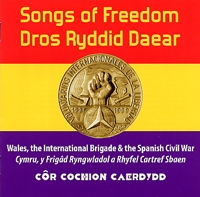Songs of Freedom by Côr Cochion Caerdydd
Côr Cochion aims to keep alive the spirit of internationalism and solidarity which inspired those who went to defend the Spanish Republic during 1936-9. The proceeds of this cd will go to the International Brigades Memorial Trust, to help it continue its educational work and fund further events and memorials in Wales.
|
Track Listing
1
Peat Bog Soldiers (from 1938 Vinyl recording **) 2:57
2 United Front (from
1938 Vinyl recording **) 2:49
3 Los Cuatros Generales (from 1938 Vinyl recording **) 2:42
4 Workers unite for the battle 1:19
5 Bandiera Rossa 1:17
6 Maruxina 2:26
7 Solidarity song 1:48
8 Freiheit (Freedom) 2:14
9 Werin Daear 2:13
10 Buddugoliaeth 3:04
11 Niclas 2:36
12 The Whole Wide World Around 2:39
13 Si Me Quieres Escribir 1:55
14 Viva La Quince Brigada 4:37
15 Jamie Foyars 2:44
16 Ay Carmela 2:05
17 Valley of Jarama 1:24
18 Miners Lifeguard 2:41
19 Sbaen 1936 3:27
20 Hen wlad fy nhadau 1:32
21 The Internationale 1:17
Total time 49:55
** Tracks from the vinyl record album ‘Six Songs for Democracy’ originally recorded in June 1938 by the German tenor Ernst Busch with a chorus from the brigade’s German Thaelmann Battalion, made during the bombardment of Barcelona. The sound quality on the CD is authetically scratchy, but the MP3 clip used on this web site has been digitally cleaned.
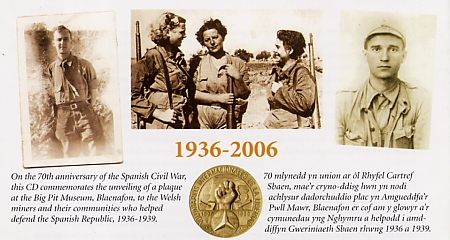 Wales
and the Spanish Civil War
Wales
and the Spanish Civil War
In the 1930s a worldwide depression led to mass unemployment, starvation and suffering. Workers became increasingly militant as the situation grew more desperate, and the forces of reaction became increasingly violent trying to maintain the established order. Two countries heavily affected were Wales and Spain. In 1934, an armed insurrection in the Asturias mining region of Spain was brutally suppressed by the conservative government. Fleeing refugees told the story to Welsh workers, especially miners, opening their eyes to the international nature of the struggle. A coalition of left wing parties won the Spanish elections in 1936 and introduced previously stalled reforms promising universal education, health care and agrarian reform. Alarmed, the right wing launched an armed revolt against the government in July, supported by Nazi Germany and Fascist Italy, which quickly became an all-out civil war. The elected Republican government sent out a cry for assistance. When they heard the news, people from 57 countries, including many Welsh miners, did not hesitate to act in solidarity. Over two thirds of the hundreds of Welsh volunteers came from the mining valleys; and many never returned. The international volunteers helped the republic score many important victories, some commemorated in these songs. In many ways, the Spanish Civil War was the opening battle of World War II, which began only six months after the final defeat of the Republic in March 1939. Though the battle for Spain was lost, the lessons learned from that heroic struggle ultimately contributed to the defeat of fascism.
Notes on the Songs
The songs on this CD commemorate the brave
volunteers who joined the 'International Brigade' They include
songs from the 30s, songs about and by the International Brigade.
The first three songs come from the vinyl record album ‘Six
Songs for Democracy’ originally recorded in June 1938 by
the German tenor Ernst Busch with a chorus from the brigade’s
German Thaelmann Battalion, made during the bombardment of Barcelona.
All others are sung by Cor Cochion, conducted by John Abraham
or Wendy Lewis.
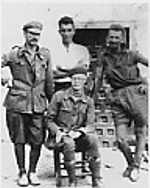 |
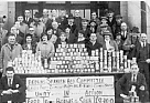 |
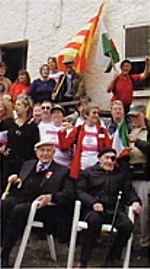 |
1.
Peat Bog Soldiers is the first and most famous song
to be composed in the concentration camps of the Third Reich.
It was’a protest on the part of the resistance fighters
against the oppressors! Written in 1933 by prisoners — the
poet Esser, with music by Goguel — it was performed
by a men’s choir in the camp, until the Nazis realised
its subversive power and banned it.‘Wherever the eye
wanders, heath and moor sormund us; no hirdsong greets us...
Up and down the guards are pacing, no one can go through,
flight would mean sure death, guns and barbed wire greet
our view... Winter will in time be gone. One day we will
cry rejoicing, homeland dear, you’re wine again:
2. United Front: music by Hans Eisler,
lyrics by Bertolt Brecht, sung in four languages by
Ernst Busch.
3. Los Cuatros Generales refers
to the four insurgent generals, Franco
and his rebels, who swore they would
capture Madrid in the first months of
the war, but failed.
4. Workers unite for
the battle: based
on a Russian none. In the spirit
of internationalism, miners
and workers challenged fascism
wherever it appeared, from
disrupting Mosleylte rallies
in Pontypridd and Tonypandy,
to the Battle of Cable Street.
5.
Bandiera
Rossa: the
ltalian
'Red
Flag.'
6.
Maruxina: this
Spanish song which
commemorate a mining
disaster, became
popular during the
Asnurian miners’ uprising
in 1934. ‘Four
miners died in the
Maria Luisa pitwith
broken heads and
shirts red with the
blood of a companion.’
7.
Solidarity
song: another
collaboration
of
Brecht
and
Fisler
which
embodies
the
spirit
of
the
Internation.
Brigades.
8.
Freiheit: (Freedom):
the
song
of
the
Thaelmann
Batallion
which
saved
Madrid
in
1936. ‘Spanish
heaven
spread
their
brilliant
starlight...
Our
homeland
is
far
away,
while
we
fight
for
you — freedom!
(Soloist:
Jame
Stewart)
9.
Werin
Daear TE
Nicholas, ‘Niclas
y
Glais'
was
one
of
the
outstanding
progressive
voices
of
Wales.
He
wrote
the
poems
which
were
used
as
the
lyrics
of ’Buddugoliaeth’ and ‘Werin
Daear’ and
translated
the’lnternational
into
Welsh,
inspired
by
the
impulse
to
build
a
world
of
socialism
and
equality. ‘People
of
the
earth,
with
bean)
chains,
walk
up
out
of
the
dark
valleys
into
the light,
break
the
shackles,
come
the
day
when
the
workers
of
Wales
will
be
free:
10.
Buddugoliaeth: the
tune
is
Cwm
Rhondda,
the
lyrics
byTE
Nicholas,
anticipating
the
victory
of
the working
classes
over
their
oppression.
11.
Niclas: words
by
Lyn
Mererid,
to
the
tune
'Rolling
Home’ by
John
Tams.
This
celebrates
the
life
of
TE
Nicholas,
from
his pacifism
during
WWI
to
hin
support
forthe
Spanish
Republic
and
his
internationalism.
12.
The
Whole
Wide
World
Around: Tom
Glazer,
the
American
Trade
Unionist,
set
new
words
to
Bach’s
chorale.
In
1940
he
recorded
songs
of
the
Spanish
Civil
War
with Pete
Seeger
and
members
of
the
Lincoln
Battalion.
13.
Si
Me
Quieres
Escribir: Member
of
the
chorus
heard
this
on
the
ferry
at
Gandesa,
on
the
65th anniversary
of
the
battle
of
the
Ebro.
There
are
many
variants
of
this
song,
and our
shortened
version
commemorates
the
Ebro
crossing
in
1938.
'If
you
want
to
write to
me,
you
know
where
you
can
always
find
me,
on
the
front
line
at Gandesa,
in
the
heat
of
every
battle.'
14.
Viva
La
Quince
Brigada: by
Christy
Moore.
Christy
Moore
wrote
this
tribute
to
the
Irish
brigaders
who
died in
Spain.
Their
comrades
who
returned
were
active
in
supporting
liberation
struggles
around
the world,
and
tirelessly
worked
to
keep
alive
the
memory
of
their
fight
against
fascism
in Spain.
15.
Jamie
Foyars: a
lament
by
Ewan
MacCull
for
a
young
Scottish
life
lost
in
Spain,
who represents
all
those
young
men
and
women
of
promise
who
believed
in
the
cause
of democracy.
(Soloist:
Wendy
Lewis)
16.
Ay
Carmela famously
celebrates
the
15th
International
Brigade,
which
sustained
terrible
losses
in
Jarama. ‘Long
live
the
15th
brigade,
who
are
covered
in
glory...
Our
only
desire
is to
overcome
fascism;
in
the
Jarama
front,
we
had
no
planes,
no
tanks,
no
cannon.
Now
we
leave
Spain
to
fight
on
other
fronts.'
17.
Valley
of
Jarama: the
song
was
a
favourite
amongst
the
English
speaking
volunteers.
We
sing
the
British version.
18.
Miners
Lifeguard: The
Welsh
Miners
Federation
made
the
largest
trade
union
contribution
to
the
British
support for
Spain.
Two
thirds
of
the
Welsh
volunteers
were
miners,
and
many
coalfield
communities, despite
their
own
desperate
poverty,
formed
Spanish
Aid
committees
to
send
financial
and
medical
help. The
warning
in
the
chorus
to ‘keep
your
eyes
upon
the
scale’ refers
to
the
coal
owners’practice
of
underweighing
the
miners’ coal
cars
before
the
onions
succeeded
in
appointing
a
union
checkweighman.
(Soloist:
Lyn
Mererid)
19.
Sbaen
1936: Tudor
Huws
Jones
wrote
this
in
the
80s
after
meeting
Jack ‘Russia’ Roberts
and
Tom
Jones,
and
hearing
of
their
experiences
in
Spain.
It
chronicles
the remarkable
contribution
made
to
the
fight
for
democracy
by
the
mining
communities
of
South Wales.
Men
from
Wales
sailed
across
the
seas,
far
from
the
comfort
of
their
villages, to
join
the
great
army
of
the
world
in
Spain. ‘Their
message
was:
smash
the
fascists)
They
came
from
LIanelli,
Neath,
Swansea...
from
west and
north,
because
they
must.'
20.
Hen
wlad
fy
nhadau: the
Welsh
anthem
written
by
Evan
and
James
James
in
1856.
'..as
long
as the
sea
is
a
wall
to
the
dear
loved
land,
so
long
may
the
language endure:
21.
The
Intemationale: the
international
revolutionary
anthem
by
Eugene
Pottier
in
1871;
Welsh
translation
byTE
Nicholas.
CREDITS
The
conductors of Côr Cochion on these recordings are John
Abraham and Wendy Lewis.
Engineering by Albany Productons Ltd. office@albanystudios.co.uk
Produced by: PMC Studios info@pmc.uk.net
Profits to: The International Brigade Memorial Trust, which aims to keep alive the memory of those who went to Spain through its educational work.
For
more information contact:
www.international-brigades.org.uk
Marlene Sidaway
Secretary of the International Brigade Memorial Trust
marlenesidaway@hotmail.com
MCPS: CC/CD
| Instruments: | Choir |
| Genre: | Political |
| Format: | Audio CD |
| Our Ref: | A0111 |
| MCPS: | CC/CD21 |
| Label: | Cor Cochion |
| Year: | 2004 |
| Origin: | UK |
| Please click here for Artist Information and Contact Details | |
